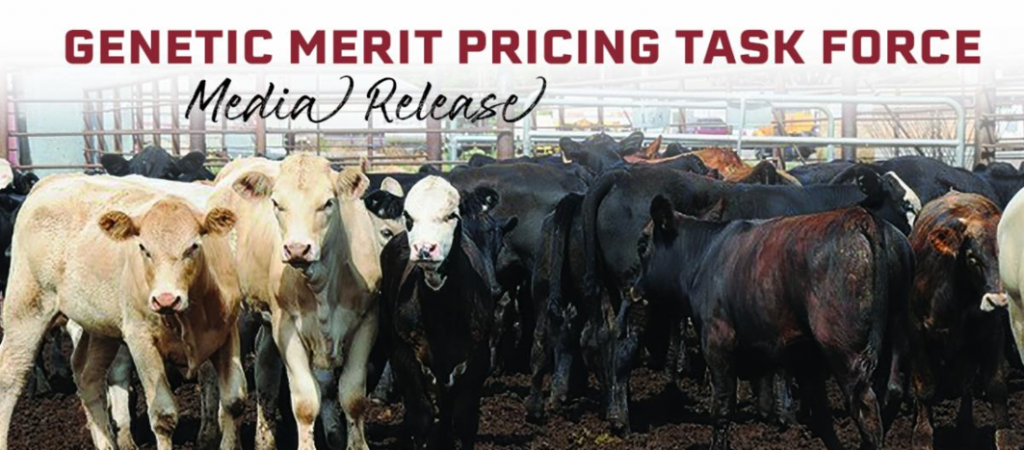
The Genetic Merit Pricing Task Force held its second meeting last month in Kansas City. Since convening in late 2023, the industry-based group has been working to help the cattle market transition toward widespread use of genetic information in pricing feeder cattle and calves. More than 95% of U.S. feeder cattle change ownership without the benefit of objective genetic information. Thus, genetic information plays almost no meaningful role in the value discovery process.
Ken Odde, Ph.D., former Kansas State University animal science department head and the group’s facilitator, says the Genetic Merit Pricing Task Force has an important mission that can help make all industry segments more efficient. “Today, few commercial beef herds use quantitative genetic information when marketing their feeder calves. While most buy bulls with EPDs and Indexes, they are not using that information in marketing their calves. Investing in genetics that are superior for growth and carcass traits without using that data for marketing purposes may be leaving money on the table.” Odde said. “Prospective buyers would then have genetic information that would help them more properly value feeder cattle they are seeking to purchase.”
At their February meeting, task force members discussed numerous topics, including the ability of genetically superior Bos Indicus cattle to grow rapidly and create valuable carcasses, as well as the important role of auction markets in helping bring genetic information into feeder cattle price discovery.
The group also participated in two breakout sessions. The first involved adding useful genetic data to written cattle descriptions that did not originally contain such information. The second breakout focused on identifying barriers to advancing the use of genetic information on both the buyer and seller side of the market. Task force members recognize numerous challenges to the industry using genetic information, many of which relate to sellers not having the necessary data and buyers not asking for or knowing what this data means.
“We call this the cold start problem,” said Tom Brink, CEO of the Red Angus Association of America and one of the task force founders. “Sellers need to begin offering genetic information before buyers will pay attention and start to use it. Buyers need to request it to encourage sellers to step up and obtain genetic information on their cattle. Both sides need to take action if we are going to make progress down this road.”
The task force also discussed the need for more genetic ‘proof of concept’ data and helping both cattle sellers and buyers understand that the genetic tools available today, Expected Progeny Differences, $Indexes and commercial DNA tests, are useful in identifying better performing cattle. David Trowbridge, task force member and manager of Gregory Feedlots in Tabor, Iowa, believes more people need to become convinced that various genetic metrics work effectively in the real world. “There are people who are still skeptical about EPDs, but there is ample research to support their predictive accuracy, especially on the highly heritable growth and carcass traits.”
The next quarterly meeting of the Genetic Merit Pricing Task Force is scheduled for May 7-8 in Denver.
Appendix 1: Task Force Participants
· James Barrett, Texas
· Dave Daley, California
· Dave Delaney, Texas
· John Grande, Montana
· Rob Gill, Oregon
· Randy Heflin, Kansas
· Scott Howard, Ph.D., Colorado
· Danny Herrman, Kansas
· Sam Hands, Kansas
· Jennifer Houston, Tennessee
· George Kempfer, Florida
· Larry Kuehn, Ph.D., Nebraska
· Dennis Metzger, Nebraska
· Grant Morgan, Kansas
· Kevin Miller, Colorado
· Mark Nelson, Nebraska
· John Nalivka, Oregon
· Austin Paul, Kentucky
· Trey Patterson, Wyoming
· Jake Parnell, California
· Dustin Puhrmann, Iowa
· Darrell Peel, Ph.D., Oklahoma
· Ryan Rice, Kansas
· Don Schiefelbein, Minnesota
· Wade Small, Idaho
· Nolan Stone, Colorado
· Matt Spangler, Ph.D., Nebraska
· Jason Timmerman, Nebraska
· Brent Thiel, South Dakota
· David Trowbridge, Iowa
· Will Townsend, Montana
· Craig Uden, Nebraska
· Janie VanWinkle, Colorado
Appendix 2: Task Force Supporting Organizations
Funding Partners
· American Hereford Association
· American International Charolais Association
· Santa Gertrudis Breeders International
· International Brangus Breeders Association
· Allied Genetic Resources/All Beef LLC
· American Simmental Association
· Neogen Corporation
· Beefmaster Breeders United
· Red Angus Association of America
Other On-Record Supporters
· American Gelbvieh Association
· Colorado Cattlemen’s Association
· Livestock Marketing Association
· North American Limousin Foundation
· North American Piedmontese Association
· American Shorthorn Association
· American Brahman Breeders Association
· Florida Cattlemen’s Association
· Idaho Cattle Association
· Alabama Cattlemen’s Association
· Kentucky Cattlemen’s Association


















